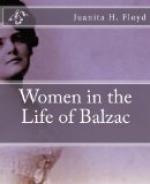“Say to your dear child the most tenderly endearing things in the name of one of the most sincere and faithful friends she will ever have, not excepting her husband, for I love her as her father loved her."[*]
[*] The Countess Mniszech died in September, 1914,
at the age of
eighty-nine, so must have
been born about 1825 or 1826. She spent
the twenty-five years preceding
her demise in a convent in the rue
de Vaugirard in Paris and
retained her right mind until the day of
her death. It will always
be one of the greatest regrets of the
present writer that she did
not know of this before the Countess’s
death, for the Countess could
doubtless have given her much
information not to be obtained
elsewhere.
Balzac was probably never more sincere than when he wrote this message, for perhaps no father ever loved his own child more devotedly than he loved Anna, the only child living of M. and Mme. de Hanski.
Most of Balzac’s biographers who state that he met Madame Hanska on the promenade, say that her little daughter was with her. Wherever he first met her, she won his heart completely. Some pebbles she gathered during his first visit to her mother at Neufchatel, Balzac had made into a little cross, on the back of which was engraved: adoremus in aeternum. She was at this time about seven or eight years of age. When he visited them again at Geneva, their friendship increased, and in writing to her mother he sent the child kisses from son pauvre cheval. He loved her little playthings, some of which he kept on his desk; was always wanting to send her gifts, anxious for her health and happiness, took great interest in her musical talent, and was ever delighted to hear of her progress or pleasures. One of his rather typical messages to her in her earlier years was: “Place a kiss on Anna’s brow from the most tranquil steed she will ever have in her stables.”
As she grew older, the novelist thought of dedicating one of his works to her, and wrote to her mother that the first young girl story he should compose he would like to dedicate to Anna, if agreeable to both of them. The mother’s consent was granted, and he assured her that the story Pierrette (written, by the way, in ten days) was suitable for Anna to read. “Pierrette is one of those tender flowers of melancholy which in advance are certain of success. As the book is for Anna, I do not wish to tell you anything about it, but leave you the pleasure of surprise.”
“To Mademoiselle Anna de Hanska:




